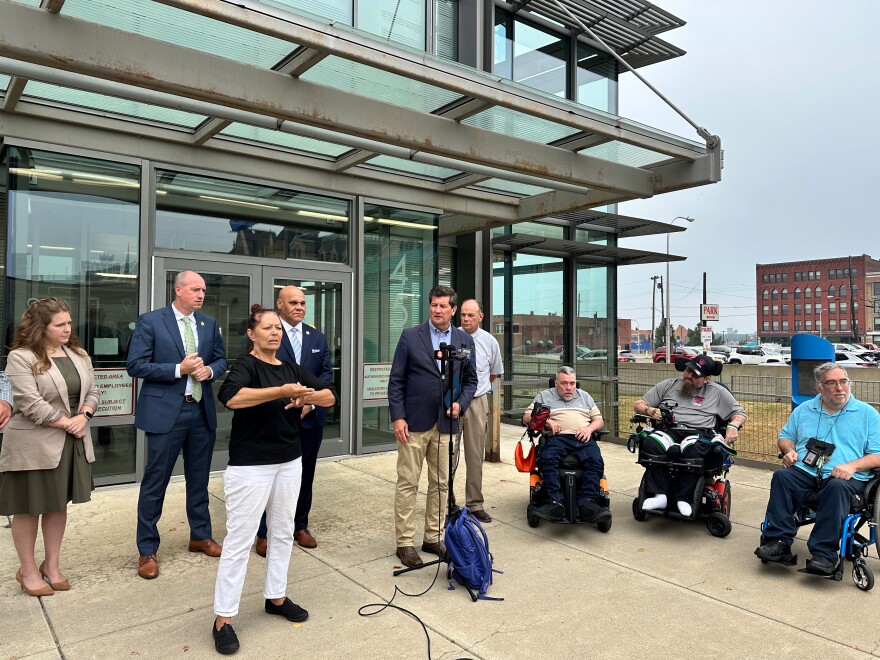After months of discussions with local advocates, the Erie County Sheriff's Office is pivoting a controversial registry to an "initiative" and making several changes.
The "Handle with Care" registry, now initiative, was launched seven months ago. It originally was a form that asked for details including where a disabled people went to school, worked and who their doctor is. It also asked for their race, disabilities, and "triggers."
Now, instead of an open form, interested parties have to ask the Sheriff's Office for a password to the form. Only a disabled person, their legal representative, or parent if they are under 18 can fill out the form.
This situation raised larger questions about how police interact with and serve people with disabilities. BTPM NPR reached out to an expert from the NYCLU to ask: do these registries or initiatives actually help, and how should they be designed?
TRANSCRIPT
This is a rush transcript written by an external contractor and may be updated over time to be more accurate.
Emyle Watkins: Hi, I'm Emyle Watkins, and this is The Disabilities Beat.
Last week, Erie County announced the Sheriff's Office was pivoting a controversial registry of people with disabilities and mental health conditions to an initiative. After outcry from the community, major changes have been made to the program, which was originally announced seven months ago.
Beth Haroules: But I think it really needs to be thoughtfully designed. If you have any sort of protocol where you're able to generate a list of everyone with this type of disability or why are you doing it? How should you do it? Should you do it?
Emyle Watkins: Beth Haroules is the Director of Disability Justice Litigation for the NYCLU. We reached out to get her take on the original registry, it's larger implications, and the changes.
Beth Haroules: When it comes to police deciding they need to know everyone who's in a particular catchment area, you have to wonder why. Why are you doing it? And again, I think there may be some good reasons to do certain things, but it has to be thoughtfully planned with the input of the individuals as well as their legal representatives with an eye towards what's the existing privacy framework.
Emyle Watkins: The original "Handle with Care" registry webpage asks for detailed information about the disabled person, from where they work and live and who their doctor is to their race and height and any "triggers" they have. Anyone could fill out the publicly available webpage. Now, an interested party will have to contact the Sheriff's Office for a password to fill out the form, and it can only be filled out by a disabled person, their legal representative, or a parent if the person is under 18 years old. This addressed some of the disability community's largest concerns.
Todd Vaarwerk: The question is for the people with disabilities, what information do they want to provide and how do they want provide it?
Emyle Watkins: Todd Vaarwek, Western New York Independent Living's Chief Policy Officer, originally called for changes to the registry and then took part in the county's revision announcement on Thursday.
Todd Vaarwerk: This initiative is kind of a continuation of other things that are also available, so if you've got something that definitely needs to get into the hands of first responders, this is something you can consider.
Emyle Watkins: Part of the controversy was also the lack of consultation with the disability community before its creation. Police Services Division Chief Tim Carney acknowledged the National Alliance on Mental Illness, or NAMI, was the only organization consulted before its launch.
Tim Carney: Well, I think we learned a lesson as to reach out to our neighbors right here in Erie County.
Emyle Watkins: Since the outcry, the Sheriff's Office met with local advocates from several organizations.
Beth Haroules: If you had consulted with the community, how do you ensure that all the members of the community, because people talk about the disability community and it's not a homogeneous kind of, everybody's got a different thing, right?
Emyle Watkins: Haroules says part of the problem with police registries and programs similar to this is the lack of public comment before they are launched.
Beth Haroules: And so do you make it publicly known? I mean, in the first instance, right, you would just sort of say, "Look, there are law enforcement exemptions already built into existing medical mental health substance privacy laws where, on a need-to-know emergent basis, you can share." That's none of this.
Emyle Watkins: However, Haroules warns for police departments interested in similar programs, that information on community members alone can be dangerous if not done thoughtfully. She points to issues with initial language used in the Erie County database.
Beth Haroules: This is sort of pre-criming people and pre-stigmatizing people. And what's their trigger? That's not how you talk about that with respect to de-escalation. So I mean, it's entirely imbued with mapping a defensive response by law enforcement when interacting with people. It's really bad.
Emyle Watkins: She emphasizes that without a wraparound of services, including trained response teams for mental health, as well as de-escalation, implicit bias, and broader disability training, you run the risk of bias interfering with response.
Erie County does assert that this program is one of several responses to growing public concern with police intervention in cases involving people with disabilities or mental health conditions, and their training does include intervention and de-escalation. We have more on the story on our website.
You've been listening to the Disabilities Beat from Buffalo Toronto Public Media. You can listen to the Disabilities Beat segment on demand, view a transcript and plain language description for every episode on our website at btpm.org. I'm Emyle Watkins. Thanks for listening.



